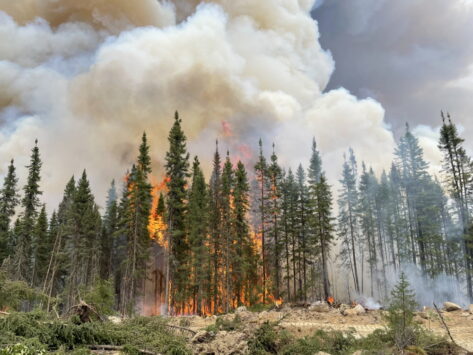Posts Mislead About Record-Setting Canadian Wildfires Fueled by Climate Change
Para leer en español, vea esta traducción de Google Translate.
Quick Take
The record-setting Canadian wildfires in 2023 were caused mainly by lightning igniting forests that were unusually hot and dry, in part due to climate change. But the recent conviction of a Quebec man led to false claims on social media that the majority of the fires were the result of arson.
Full Story
In 2023, Canada experienced its most extreme fire season to date. Beginning in the spring, the record-setting wildfires in both the eastern and western provinces burned about 46 million acres and displaced more than 150,000 people. As a result of smoke from the fires, U.S. cities, including New York, Chicago, Minneapolis and Detroit, also endured poor — and, in some cases, hazardous— air quality.
On Jan. 15, a Quebec man, Brian Paré, pleaded guilty to 13 counts of arson and one count of arson with disregard for human life. In May, with 12 active fires already burning in Quebec, Paré, a conspiracy theorist, began setting his own fires with the intention of finding out “whether the forest was really dry or not,” Quebec Prosecutor Marie-Philippe Charron told the court. Paré claimed on social media posts that the previous fires had been set by the Canadian government to convince people to believe in climate change, the Canadian Press reported.
Two of the 14 fires set by Paré forced evacuations of hundreds of nearby homes. The largest blaze, the Lake Cavan fire, burned about 2,000 acres of forest.
 A view of wildfires at Lebel-sur-Quevillon in Quebec, Canada, on June 23, 2023. Photo by Frederic Chouinard/SOPFEU / Handout/Anadolu Agency via Getty Images.
A view of wildfires at Lebel-sur-Quevillon in Quebec, Canada, on June 23, 2023. Photo by Frederic Chouinard/SOPFEU / Handout/Anadolu Agency via Getty Images.
By comparison, more than 11 million acres burned in Quebec in 2023.
Experts say that climate change did play a role in Quebec’s unusually bad fire season. An analysis by 17 researchers for World Weather Attribution — an organization that “quantifies how climate change influences the intensity and likelihood of an extreme weather event” — found that climate change made the hot and dry conditions more likely and made the fire season in Quebec 50% more intense than it would have been otherwise.
But some social media posts, citing the guilty plea of Paré, have falsely claimed that arson was responsible for most of the fires in Quebec — not climate change.
In a Jan. 15 Instagram post sharing the news of the guilty plea by Paré, one user wrote: “FakeNews Media and corrupt politicians made it clear to all that forest fires were a direct result of GlobalWarming… A small minority knows to follow the facts carefully and know that majority of fires were from man’s arson or negligence.” The post received more than 2,000 likes.
In a post on Feb. 6, another user shared the headline, “Quebec man pleads guilty to setting 14 forest fires — [Prime Minister Justin] Trudeau claimed it was climate change.” The user added in the caption: “They squashed the arson story immediately, well it was true.”
But as we said, the largest fire set by Paré burned about 2,000 of the total 11 million acres burned in Quebec during the 2023 fire season. A spokesman for the Quebec Forest Fire Protection Agency told AFP Fact Check that fires with a criminal origin accounted for less than 0.02% of the fires in that province. The vast majority of the fires were caused by lightning that ignited abnormally dry forests.
“Human-caused fires can be distinguished from lightning-caused fires with pretty good certainty,” Mike Wotton, a research scientist with the Canadian Forest Service stationed at the University of Toronto, told us in a Feb. 8 email. “The large fires in Quebec that burned from June onward and led to smoke circulating through the Eastern seaboard for many days were very clearly the result of lightning.”
The social media posts also create a false dichotomy between arson and climate change as the “cause” of the fires. In reality, neither would be the sole cause of any wildfire. A person can intentionally or accidentally light a fire — or lightning can strike — but if the conditions aren’t right, the blaze won’t take off or spread easily. And regardless of what starts a fire, climate change can be a contributing factor in making a fire more likely or more severe.
“In the areas of the north where those fires started in Eastern Ontario and Quebec, it was an extremely warm late spring and early summer,” explained Wotton, whose research has focused on the effects of climate change on fire activity. “When lightning storms went through the north of Ontario and Quebec many new fires were ignited” in the dried forests.
“It was earlier than normal to get such an impactful lightning fire event. … But that is the challenge we are facing with warmer temperatures that we are experiencing most every year these days,” he said.
“They will not all be terrible years like this past one,” Wotton said, “but we will have to get used to a lot more threat from fire and smoke being in our lives a lot more regularly.”